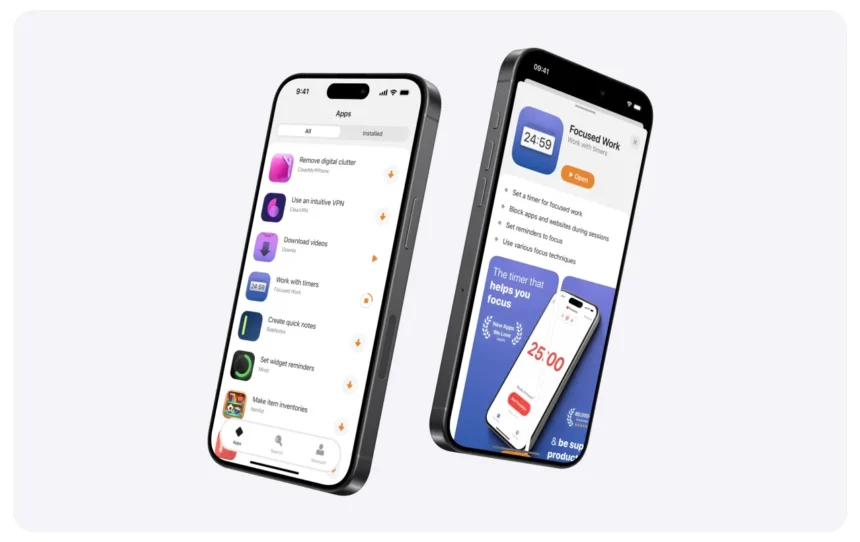Ukraine-based software company MacPaw, renowned for its Mac and iOS applications, has announced the open beta launch of Setapp Mobile, an alternative iOS app store for the European Union. This bold move follows new regulations under the EU’s Digital Markets Act (DMA), designed to foster competition and reduce the dominance of major app marketplaces like Apple’s App Store.
After several months of closed beta testing with select users, MacPaw is now inviting all users in the EU to experience Setapp Mobile. This alternative store comes stocked with over 50 apps, ranging from productivity tools to creative and financial apps. Notable apps include CleanMyPhone, ClearVPN, Riveo video editor, Awesome Habits tracker, Time Master, BusyCal, Free Your Music, MonAI, Elk currency converter, Ochi focus manager, Bookshelf: Reading Tracker, and AdLock.
A Subscription-Based Marketplace
Unlike traditional app stores where users purchase individual apps, Setapp Mobile is built on a subscription model. For a monthly fee of $9.99—preceded by a seven-day free trial—users gain access to the entire app library. To use Setapp Mobile, devices must be running iOS 17.4 or later, and the Apple ID must be associated with an EU member state.
Although Setapp Mobile is technically a marketplace, the subscription model offers a different experience compared to purchasing individual apps. This all-in-one pricing aims to provide users with a simple, convenient way to access a diverse range of apps without worrying about hidden costs or one-off purchases.
Navigating the Challenges of an Open Beta
MacPaw’s Director of Marketing, Yaroslav Stepanenko, shared insights into the company’s decision to move forward with the open beta: “We see areas of improvement in terms of user experience, number of applications, and the categories we offer. We think there is demand for an alternative app store, so we decided to launch it and tune our business model based on the feedback from users,”

The open beta allows MacPaw to test its approach in real-time, gathering feedback from a broader audience while refining its business model. Stepanenko emphasized the importance of balancing the number of apps available with the growing user base: “We can’t have a low number of apps and a lot of users, and vice versa. Finding that balance will be crucial as we grow.”
He also confirmed that Setapp Mobile will not seek to overwhelm users with hundreds of apps, instead focusing on quality and discoverability. The aim is to provide developers with an environment where their apps stand out, avoiding the pitfalls of overcrowded marketplaces.
Entering the iOS Arena
MacPaw’s shift from Mac-focused software to iOS marks a significant expansion in its business strategy. The company has a strong reputation for delivering high-quality desktop apps, supported by a subscription model that grants users access to a wide range of tools. Setapp Mobile is a continuation of this approach, but tailored to iOS users in the EU.
“We have a really good track record in distributing apps in the desktop space. Now we have to replicate and apply that experience to the iOS space in the EU,” Stepanenko noted.
Setapp’s arrival signals an opportunity for millions of iPhone users to explore a new marketplace—one that offers curated apps while providing a smooth and transparent subscription service.
Regulatory Hurdles: Apple’s Core Technology Fee
While the Digital Markets Act has opened the door for alternative app stores, the road ahead is not without obstacles. One of the most contentious aspects of Apple’s compliance with the DMA is its introduction of the Core Technology Fee (CTF). Under this policy, developers who distribute apps via non-App Store platforms are required to pay €0.50 for each first annual install after exceeding 1 million installs.
This fee has sparked controversy, with regulators investigating whether Apple’s terms align with the spirit of the DMA, which aims to increase competition. For developers like MacPaw, the long-term impact of this fee remains uncertain. Stepanenko revealed that MacPaw has not yet determined whether it will be subject to these fees as Setapp Mobile grows.
The Growing Competition in the EU’s Alternative App Store Market
MacPaw isn’t alone in exploring this newly opened market. Other companies are also attempting to carve out a space in the EU’s alternative app store landscape. Earlier this year, Aptoide—long known for its third-party Android store—launched a game-focused store in Europe. AltStore PAL, offering game emulators like Delta alongside Patreon-backed apps, is another notable entrant.
While these stores are still in the early stages, they are capitalizing on initial curiosity from users eager to try something new. However, the real challenge will be retaining these users over time. Marketing to different categories of users and offering a strong value proposition will be key for these third-party stores to thrive in the long run.
The Road Ahead for Setapp Mobile
Setapp Mobile’s open beta represents a significant step forward for MacPaw as it expands its reach in the mobile space. As the company collects feedback and refines its offering, it hopes to create an alternative app store experience that combines convenience, quality, and competitive pricing for EU iPhone users.
While there are still many unknowns—including how Apple’s Core Technology Fee will impact the economics of alternative app stores—MacPaw remains optimistic about the future of Setapp Mobile. If successful, this could signal the beginning of a more open, diverse app ecosystem for iOS users in the European Union.










